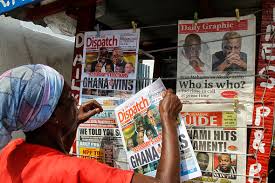The report that the Ghana Health Service (GHS) has vaccinated about 800,000 Ghanaians against COVID-19 since the rollout of the mass vaccination exercise across the country on March 2, 2021 is one of the leading stories in the Ghanaian press on Thursday.
The Graphic reports that the Ghana Health Service (GHS) has vaccinated about 800,000 Ghanaians against COVID-19 since the rollout of the mass vaccination exercise across the country on March 2, 2021.
The Director General of the Service, Dr. Patrick Kuma-Aboagye, who announced this in Kumasi in the Ashanti Region, said nearly all health workers, both public and private, had been vaccinated.
He was speaking during the 2021 first senior managers’ meeting of the Service being held in Kumasi on the theme: “Strengthening Service Delivery and Sustainable System for Health: Amidst COVID-19 and Beyond to Achieve UHC.”
The three-day meeting brought together senior managers from all 16 regions to assess the 2020 performance and strategize for effective health delivery.
Dr. Kuma-Aboagye paid glowing tribute to the thousands of health workers for the relentless efforts and strong support provided over the past year.
“As a service, we have demonstrated our resilience in delivering primary and secondary care services to the entire population of Ghana and this has attracted positive national and global attention,” he said.
The newspaper says that about 480 doses of the AstraZeneca COVID-19 vaccines delivered to the Northern Regional Health Directorate have gone waste due to the Directorate’s inability to exhaust its supply of vaccines at the close of the vaccination exercise on Tuesday, April 13, 2021.
The vaccines were to expire on Friday, April, 16, but the Directorate decided to end the vaccination exercise as a precautionary measure on the advice of the Food and Drugs Authority (FDA).
According to the Director in charge of Public Health, Hilarious Abiwu, the AstraZeneca vaccines which were produced on October 16, 2020, were expected to be used within six months, after which they were likely to lose their potency.
He explained in an interview on Accra-based radio station, Citi FM, that “This batch of vaccines was manufactured on 16 October 2020 and FDA approves that we can use it within six months. So effectively, the sixth month will be the 16th [of April], so for safety reasons, FDA anticipated that we shouldn’t vaccinate to the very last day. So we had three clear days to the six months date.”
The Northern Region began its COVID-19 vaccination exercise on March 26, 2021, with some 17,000 doses targeting health workers.
The exercise, which was intended to last for five days was extended due to some technical challenges and low turnout by health workers.
The Graphic also reports that President Nana Addo Dankwa Akufo-Addo yesterday signed the Book of Condolence for the late Prince Philip, the Duke of Edinburgh, at the British High Commission in Accra.
Prince Philip was the husband of Queen Elizabeth II of the United Kingdom of Great Britain and Northern Ireland and member of the Royal Family.
He was born on June 10, 1921 and died on April 9, 2021.
The President wrote: “We were all very sad in Ghana to learn of the passing of Prince Philip, the Duke of Edinburgh. He has many admirers in Ghana who have vivid memories of his visit to our country.
“We appreciate very much the works of this body, the Duke of Edinburgh Awards Scheme, which has benefited hundreds of thousands of Ghanaians.”
He added: “We express our deep condolences to Queen Elizabeth II in her period of mourning and loss. We pray for God’s strength for her, her children and family and also ask for God’s blessing in this period. May his soul rest in peace.”
Earlier in a statement, President Akufo-Addo had expressed his condolence to Queen Elizabeth and the British Royal Family on the death of Prince Philip.
The Times says that there has been dramatic acceleration in mobile transactions during the COVID-19 pandemic as lockdown restrictions limited access to cash and financial institutions, GSMA annual State of the Industry report has revealed.
The report found that the number of registered accounts grew by 13 percent globally in 2020 to more than 1.2 billion, double the forecast.
The fastest growth according to the report, was in markets where governments provided significant pandemic relief to their citizens.
To minimise the economic toll of COVID-19, many national governments distributed monetary support to individuals and businesses.
The value of government-to-person payments quadrupled during the pandemic, with the mobile money industry working hand-in-hand with administrations and NGOs to distribute social protection and humanitarian payments quickly, securely, and efficiently to those in need.
Facilitating this type of direct income support payments is one example of how mobile money provides a financial lifeline to underserved communities. Mobile money providers have also provided in-kind support, including the distribution of personal protective equipment (PPE) and hand sanitising gel at agent counters.
“We see that mobile money is a powerful tool for expanding the financial inclusion of women in low- and middle-income countries,” John Giusti, the GSMA’s Chief Regulatory Officer said.
GIK/APA


